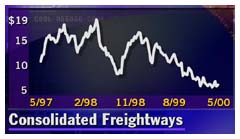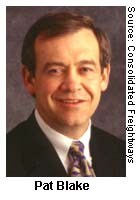|
Trying to get back on road
|
 |
May 17, 2000: 12:19 p.m. ET
New CEO of CF says time is right to return trucking company to profitability
By Staff Writer Chris Isidore
|
NEW YORK (CNNfn) - It took the board of Consolidated Freightways Corp. nearly four months to decide Patrick Blake, the company's number two executive, was the one who was best suited to move into the vacant number one job.
Now the question is whether Blake, as the new CEO, can keep the company independent and restore it to the profit levels it needs to survive.
The Menlo Park, Ca.-based company, known as CF, was nearly purchased by Yellow Corp. (YELL: Research, Estimates), another major trucking company in its industry segment, in December 1998. The 17 months since those talks collapsed have not been good ones for CF (CFWY: Research, Estimates) or its shareholders.
Managers nervous about the future left, a switch to a new computer system caused operational problems, and a year that saw its main competitors all improve profit margins ended with CF profit dropping to nearly break-even results.
 Those problems led to the departure of W. Roger Curry, the chief executive who had a strong reputation of being able to turn around troubled transportation companies. His departure on the day 1999 results were announced in January, and lack of a successor being named, spurred a new round of take-over rumors in the industry. Those problems led to the departure of W. Roger Curry, the chief executive who had a strong reputation of being able to turn around troubled transportation companies. His departure on the day 1999 results were announced in January, and lack of a successor being named, spurred a new round of take-over rumors in the industry.
These rumors apparently were not accurate - four months later CF is still independent. Blake, who got the company's top job last week, said he believes it will stay that way.
"Last year had the majority of the problems," said Blake. "Yeah, there was an impact (from merger rumors), no doubt. But if we had to pick the timing to get back to profitable growth, now is probably the best time in my 30 years in the business."
That's because despite rising fuel prices, the profit generally increased in CF's segment of the trucking business in the first quarter, due to strong demand for freight and less capacity from closures of a number of other smaller unionized carriers since CF's own merger talks with Yellow.
The sector, known as less-than-truckload or LTL, handles pallet-sized shipments of freight through a series of warehouses, which raises labor and overhead costs more than other segments of the industry, thus making fuel somewhat less significant cost on a percentage basis.
First quarter shows some improvement
The tight demand for LTL carriers allowed them to win fuel surcharges from many of their customers since the spike in fuel prices. CF's first quarter showed signs of improvement from the loss in the fourth quarter, which generally a much stronger period for trucking than the first three months of the year.
But it was well below year-ago results. The company earned $1.1 million, or 5 cents a diluted share, before special items in the period, much better than the 5 cent a share loss forecast by analysts, but below the $6.8 million, or 30 cents a share, it earned a year earlier. A charge for past taxes related to past tax liability resulted in a net loss of $3 million, or 14 cents a share.
Blake said part of the plan is to give up some business that wasn't paying rates sufficient to cover costs, despite the strong freight environment. That means that revenue may shrink this year as the company focuses on profitability.
 "We might have gone too far pursuing business where our mix was not proper," he said. But despite the strong freight demand at this time the recent interest rate rises by the Federal Reserve is give Blake and other industry observers reason for concern about future demand. "We might have gone too far pursuing business where our mix was not proper," he said. But despite the strong freight demand at this time the recent interest rate rises by the Federal Reserve is give Blake and other industry observers reason for concern about future demand.
"I think there's a little bit of concern about fed putting brakes," he said. "But at this point I don't see general overall use of (lower freight) prices in LTL to gather market share."
Blake said there's nothing unusual with the board taking nearly four months to turn to him, but some analysts wonder if that suggests that Blake wasn't the first choice, or that the troubled company had trouble attracting someone from the outside.
"I'd like to give Pat Blake a chance, to hear what his strategic vision is for the company," said Doug Rockel, trucking analyst with ING Barings. "But I go into it with apprehension knowing Roger (Curry) had a good background and a good track record. Why is Pat going to succeed where someone like Roger didn't?"
Growing competition from nonunion carriers
The unionized carriers such as CF are seeing growing competition from nonunion regional carriers who are forming networks to handle freight on a long-haul basis. CF was spun-off from a holding company now known as CNF Inc. (CNF: Research, Estimates), which owns the leading nonunion carrier, Con-Way Transportation Services, in 1996.
Many wonder if with their higher labor costs the industry can continue to support four unionized national carriers long-term. CF's difficulties of the past year put the spotlight on its chances for survival.
"The deal that very publicly didn't happen was very detrimental to the company," said Paul Schlesinger, analyst with Donaldson Lufkin & Jenrette. "It probably contributed to the poor performance that might have ultimately cost Roger Curry his job."
Schlesinger said the plight of those four carriers - CF, Yellow Freight, Roadway Express Inc. (ROAD: Research, Estimates) and number four ABF Freight, a unit of Arkansas Best Corp. (ABFS: Research, Estimates), has most observers expecting one to disappear eventually.
"It's hard to tell how many excess players there are, but it seems like at least one (too many)," he said. "There is a survival race."
Potential buyers tough to identify
Still, one of the best things working for CF's long-term survival is that potential buyers may be hard to come by at this time.
Roadway officials have shown no inclination to buy another company, Yellow has moved to buying nonunion regional carriers since the CF deal fell apart, and Arkansas Best's last major purchase of another unionized carrier in 1995 caused it tremendous operating problems, which hit its balance sheet for years.
It would be difficult to find someone outside the field to buy the company, given substantial underfunding of some multi-employer Teamster pension funds. Owning CF could leave a buyer on the hook not only for its own share of underfunding but the amount owed retirees of other carriers that have gone out of business.
Cash-rich United Parcel Service (UPS: Research, Estimates) is already in many of those pension plans, and would therefore see less additional liability than many buyers. But the company is already competing effectively with LTL carriers without buying a troubled carrier with much thinner margins. Most analysts think that rumors of UPS being a buyer in the sector is simply wishful thinking by shareholders.
So Blake may well get his wish of continued independence, even if the turnaround remains elusive. Still analysts aren't willing to predict a rosy future for the company yet. The consensus recommendation on the company is a hold, according to First Call.
"They would need a semblance of stability within the organization and within the industry to make a buyer willing to take the risk of an acquisition, other than at a real distressed price," said one analyst who asked his name not be used. 
-- Click here to send email to Chris Isidore
|
|
|
|
|
 |

|

